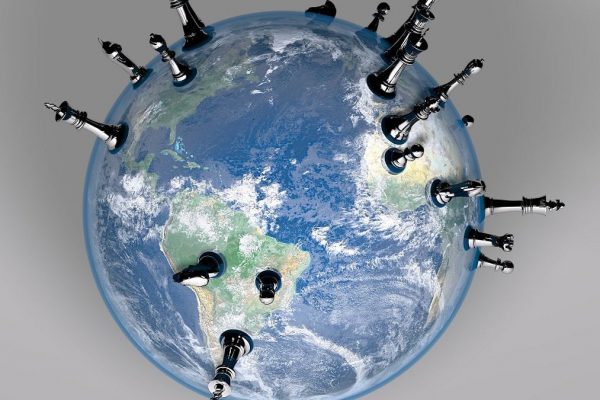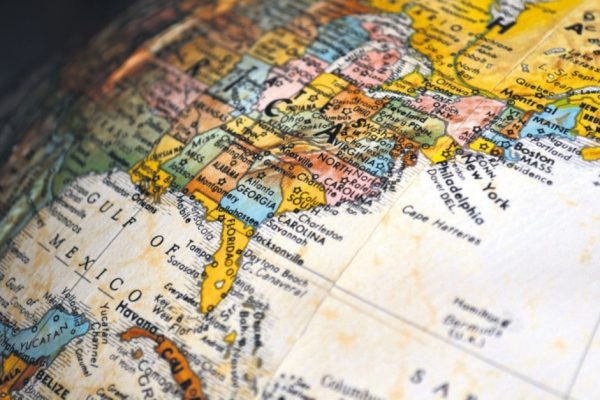This Article corresponds to the “Global Business Strategies” course as part of the Rochat MBA program and was submitted by the student Maneka Jacob.
Geopolitics For 2021 And Their Impacts for Global Business
Introduction to the pandemic and geopolitics for 2021
“Coronavirus disease 2019 (COVID-19) is a contagious disease caused by severe acute respiratory syndrome coronavirus 2 (SARS-CoV-2) The first case was identified in Wuhan, China, in December 2019. It has since spread worldwide, leading to an ongoing pandemic.” (Wikipedia, 2021). COVID-19 has brutally awakened the world from a slumber of optimism in decades of periodical and isolated pandemic risks. The magnitude and shock of the pandemic had quickly spilled over to the global economy, resulting in a drastic decline in economic activity due to social distancing restrictions, country border closures and other transportation and business operation restrictions which has drastically changed the geopolitical arena. Many economists cite that this pandemic may have just accelerated existing geopolitical issues whilst others think that this pandemic has completely redefined our geopolitical outlook. I will be exploring both theories as I dive into two major geopolitical outlooks in 2021, how these were impacted by the COVID-19 pandemic and what impact and implications they have on global businesses.
Climate change and its implications
One major geopolitical outlook in 2021 is our response to climate change. Since the 19th century we have discovered climate change (Wikipedia, 2021) and has done very little to the extent of the damage to stop and reverse its effect, in fact we have done much more harm and have been accelerating this rate each year. (BBC Future, 2021) tells us just how bad the damage is with record hitting CO2 emissions in 2020, mass deforestation of over 178 million hectares of forest since 1990, record breaking temperatures this decade with 2020 being 1.2C hotter than the average year in the 19th century, the warming of the Earth’s permafrost, releasing CO2 and methane in the air which is supercharging and fueling global warming and melting the arctic ice and glaciers, rising sea levels. What does global warming mean for the world? According to (National Geographic, 2020) sea levels are expected to rise 10-32 inches or higher by the end of this century. Hurricanes and other storms are likely to become stronger, floods and droughts will become more common, less freshwater will be available, ecosystems will continue to change with some species extinctions and the spread of new and more diseases.
Impact of COVID-19 on climate change and its 2021 geopolitical outlook
COVID-19 has impacted climate change in a positive way, in more ways accelerated the action and responses from global leaders. Many saw the impactful changes to the environment during the lock downs, with improvements in air quality, water quality, seismic noise levels global reduction of 50%, carbon emissions saw 8.8% global reduction in first half of 2020 compared to same period previous year (Wikipedia, 2021), which has opened the eyes of world leaders and businesses on the importance of protecting the Earth and maintaining a natural balance. We have seen countries signing major carbon emissions cut like China, UK, EU, Japan and South Korea now totaling 110 countries to set net zero target for mid-century (BBC, 2021). Much of these detailed action plans will unfold in the Paris agreement, “a legally binding international treaty on climate change”, (UNFCC, 2021) during the Glasgow next meeting this year November. We’ve seen the EU and US promised trillions for ‘green investment’ to get their economies going and start the decarbonization process, where they also warn of possible importation tax on high carbon emitting countries (Climate Change News, 2020; The New York Times, 2021; Earth.Org 2020). It is expected to see events continue down this path with a steep increase over the next few years as can be seen in Germany’s DZ Bank projection on the green bond market in graph just below. We can expect more legislations and policies to curtail business practices contributing to climate change and more investments through reduced taxation, cash grants and stimulus to encourage the going ‘green’ initiative.
The accelerated global response to climate change and it’s impact on global businesses
These huge changes and fast occurring will impact global businesses, on the positive side Businesses producing ‘green’ products are expected to be in the demand, have large profits, and have an estimated bullish economic outlook of their share value. This new trend can be seen with Tesla, a ‘green or electric’ car manufacturer, whose sales rose above other automakers during the pandemic (New York Times, 2020). This positive ‘green’ trend will be contagious for other businesses as they race to adapt to stay ahead of competition. There will be a need for new or enhanced skillset in this area which may drive competition in the talent acquisition arena. It is expected that there will be government funding or reduced taxation to encourage the ‘green’ transition, (BBC, 2021). Naturally we can expect climate change laws and policies globally and internationally to curtail CO2 emissions, which may even see heavy tax impositions on these businesses and countries. Compounding this, will be a decline in demand and production of or investment in CO2 emitting equipment, machinery, business processes, which will see a bearish economic outlook. This is expected to heavily impact the oil industry as investment cost to locate, extract and refine oil will not have profits or return on investments, (BBC, 2021). Whilst businesses can elevate or damage their reputation depending on their corporate climate change strategies, (Geostrategic Business Group, 2020, p.13).
Investment into ‘Green Bond’ Climate change

Redefinition of Globalization: De-globalization
Another major geopolitical outlook in 2021 is deglobalization. Globalization is “the growing interdependence of the world’s economies, cultures, and populations, brought about by cross-border trade in goods and services, technology, and flows of investment, people, and information” (PIIE, 2021). The pandemic has forced world leaders to rethink their supply chain, China who is the main producer and supplier was the first to close down businesses and its borders disrupting the global supply chain. Countries globally were out of stock of many items including essential items which escalated their risks during the pandemic (Supply Chain, 2020). This event prompted global leaders to look to reshoring/domestic production. Japan offered up USD two billion as subsidies and loans to encourage countries to shift their production back to Japan (Forbes 2020), UK initiated the idea of a 5G club seeking alternative 5G suppliers along with India and South Korea to avoid reliance on China (The times, 2020). In June, the EU started a review of its trade policy with the aim of reshoring Europe’s industry (Politico, 2020). Whilst the US strengthens calls for reshoring after the pandemic, with new US president Biden’s plan to accelerate reshoring with the aim of reshoring five million manufacturing jobs (Industry Week, 2021).
2021 geopolitical outlook on De-globalization and its impact for global businesses
We can expect to continue to see governments investment to encourage businesses to reshore their operations, this is very evident in all the above-mentioned initiatives by Japan, UK, South Korea, India and the US. Very recently US president Biden after his first meeting with China said “…if we don’t get moving, they’re going to eat our lunch,” and is in no hurry to abolish the Trump administration’s imposed tariffs on China (CNN, 2021). These events and stimulus are expected to encourage domestic production, which will increase employment rates in host countries, reducing monies paid out for unemployment, other factors like industrial pollution, natural resource depletion and immigration will have to be carefully looked at. However many countries are off to a rough start as the cheap labor, skilled resources, knowledge, readily available raw materials, efficient process and technology or equipment required may not be readily available, which will increase cost of production and reduce business profits (Harvard Business Review, 2020). Not to mention this will also have a huge negative impact on developing countries, loss of trade opportunities and long term economic loss (World Economic Forum, 2020), some other back lashes are trade tensions between countries, mass job loss, decreased state income from revenues and taxes, decrease quality of life and increased crime rate and violence. However, with all the pro de-globalization talks and the big shake up expected, I don’t believe there will be a complete obliteration of globalization just because of the complex nature of production and cross border trade, for example, the COVID vaccine, that is mainly produced in European countries, US and India will still support globalization with the distribution to other states (European Journal of Public Health (Oxford University Press), 2020).
Figure 1: Stock Market Prices, S&P 500

Note: Our dataset contains S&P 500 daily share prices between 2nd January 2020 and 25th March 2020. https://ecipe.org/blog/globalization-after-covid19/
Conclusion
It is very evident that the geopolitical outlook for 2021 reveals an accelerated and drastically changed climate as a result of the Covid-19 pandemic which has both positive and negative impacts on businesses on the climate change and de-globalization forefronts. The impact and survival of a business will be dependent on how it aligns itself with current geopolitical events and how fast it adapts to geopolitical changes in the marketplace and country.
References
- Wikipedia. (2021). Coronavirus disease 2019. Retrieved fromhttps://en.wikipedia.org/wiki/Coronavirus_disease_2019 on 2/12/2021
- Wikipedia. (2021). History of climate change science. Retrieved fromhttps://en.wikipedia.org/wiki/History_of_climate_change_science#:~:text=The%20history%20of%20the%20scientific,greenhouse%20effect%20was%20first%20identified.&text=During%20the%201970s%2C%20scientific%20opinion%20increasingly%20favored%20the%20warming%20viewpoint on 2/12/2021
- BBC Future (2021). The state of the climate in 2021. Retrieved from https://www.bbc.com/future/article/20210108-where-we-are-on-climate-change-in-five-charts on 2/12/2021
- National Geographic. 2021. Effects of global warming. Retrieved from https://www.nationalgeographic.com/environment/global-warming/global-warming-effects/ on 2/12/2021
- Wikipedia. (2021). Impact of the COVID-19 pandemic on the environment. Retrieved fromhttps://en.wikipedia.org/wiki/Impact_of_the_COVID-19_pandemic_on_the_environment on 2/12/2021
- BBC. (2021). Why 2021 could be turning point for tackling climate change. Retrieved from https://www.bbc.com/news/science-environment-55498657 on 2/12/2021
- United Nation Framework Convention on Climate Change (UNFCCC). 2020. The Paris Agreement. Retrieved from https://unfccc.int/process-and-meetings/the-paris-agreement/the-paris-agreement on 2/12/2021
- Climate Change News. 2020. EIB approves €1 trillion green investment plan to become ‘climate bank’. Retrieved from https://www.climatechangenews.com/2020/11/12/eib-approves-e1-trillion-green-investment-plan-become-climate-bank/#:~:text=European%20governments%20have%20approved%20a,to%20be%20spent%20by%202030.&text=The%20bank%20will%20end%20funding,support%20large%20road%2Dbuilding%20projects. On 2/12/2021
- The New York Times. 2021. Biden Announces $2 Trillion Climate Plan. Retrieved from https://www.nytimes.com/2020/07/14/us/politics/biden-climate-plan.html on 2/12/2021
- Earth.Org. (2020). Carbon Tax: A Shared Global Responsibility For Carbon Emissions. Retrieved from https://earth.org/carbon-tax-a-shared-global-responsibility-for-carbon-emissions/ on 2/12/2021
- New York Time. 2020. Tesla Shines During the Pandemic as Other Automakers Struggle. Retrieved from
https://www.nytimes.com/2020/07/02/business/tesla-sales-second-quarter.html on 2/12/2021
- Geostrategic Business Group. 2020. 2021 Geostrategic Outlook. Reinvigorated climate policy agendas. P13. Retrieved from www.ey-gbg-2021-geostrategic-outlook%20(1).pdf
on 2/12/2021
- Peterson Institute for International Economics (PIIE). 2021. What is Globalization? Retrieved from https://www.piie.com/microsites/globalization/what-is-globalization on 2/12/2021
- Supply Chain. 2020. What COVID-19 taught us about the Supply Chain. Retrieved from https://www.supplychaindigital.com/supply-chain-2/what-covid-19-taught-us-about-supply-chain on 2/12/2021
- Forbes. 2020. Japan Ditches China in Multi-Billion Dollar Coronavirus Shakeout. Retrieved from https://www.forbes.com/sites/kenrapoza/2020/04/09/japan-ditches-china-in-multi-billion-dollar-coronavirus-shakeout/?sh=4fbfba3b5341 on 2/12/2021
- The Times. 2020. Downing Street plans new 5G club of democracies. Retrieved from https://www.thetimes.co.uk/article/downing-street-plans-new-5g-club-of-democracies-bfnd5wj57 on 2/12/2021
https://www.politico.com/news/2020/06/16/brussels-forges-new-weapons-to-shield-eu-market-from-china-325145 on 2/12/2021
- Industry Week. (2021). Biden vs. Trump on Reshoring: A Review, and a Critique. Retrieved from
https://www.industryweek.com/the-economy/trade/article/21154656/biden-vs-trump-on-reshoring-a-review-and-a-critique on 2/12/2021
- CNN. 2021. Biden speaks with Chinese President Xi Jinping for first time as President. Retrieved from
https://edition.cnn.com/2021/02/10/politics/biden-xi-call/index.html on 2/12/2021
- Harvard Business Review. 2020. Bringing Manufacturing Back to the U.S. Is Easier Said Than Done. Retrieved from https://hbr.org/2020/04/bringing-manufacturing-back-to-the-u-s-is-easier-said-than-done on 2/12/2021
- World Economic Forum. 2020. How deglobalization is hurting the world’s emerging economies. Retrieved from https://www.weforum.org/agenda/2020/09/convergence-threatened-by-deglobalization-covid19/ on 2/12/2021
- European Journal of Public Health (Oxford University Press). 2020. Vaccines in support of globalisation: the current status of coronavirus and future implementation challenges. Retrieved from: https://www.ncbi.nlm.nih.gov/pmc/articles/PMC7543433/2 on 2/12/2021






